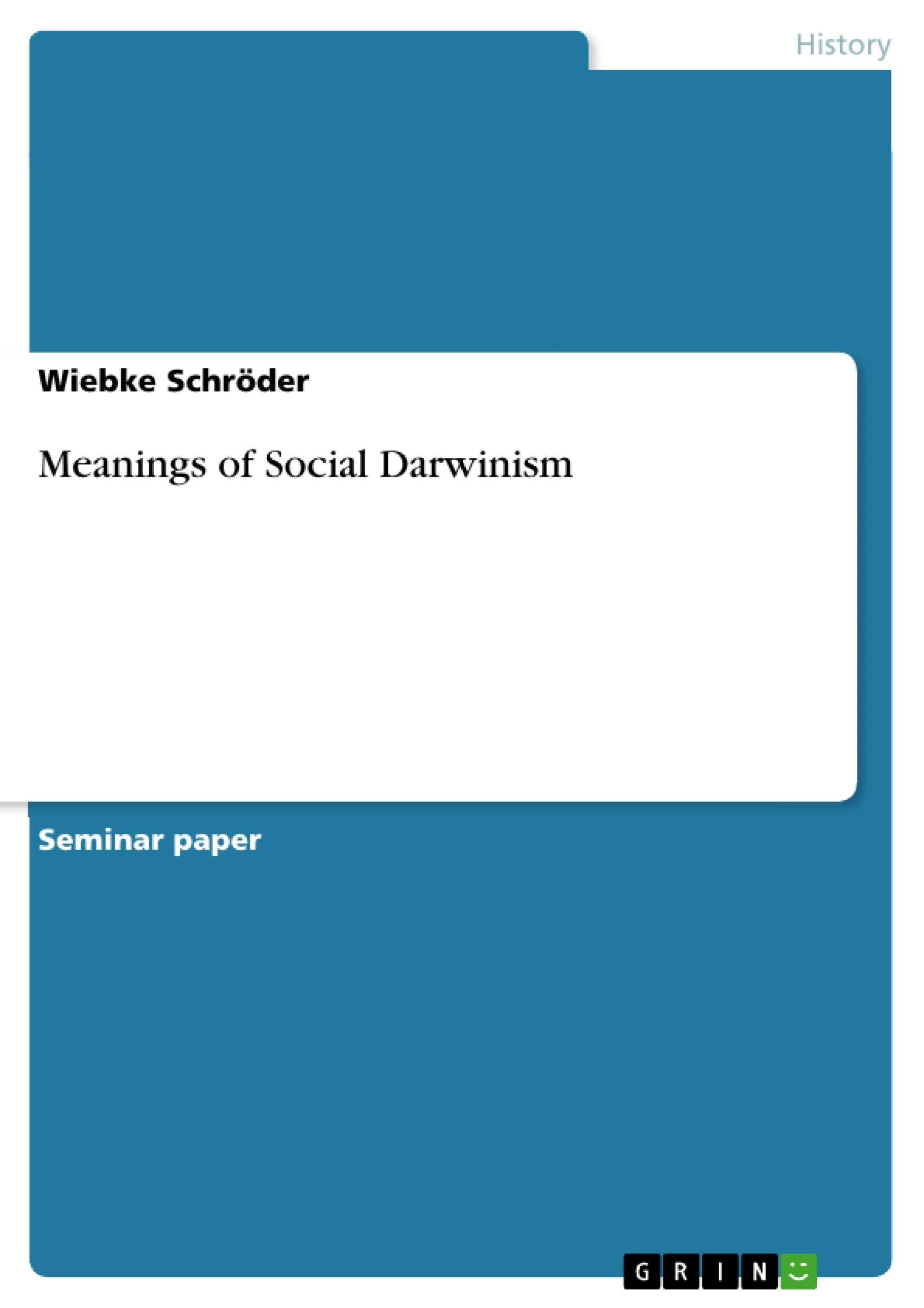[...] In this paper I want to show how one particular difference in defining social Darwinism affects the manner of telling history. Namely, the difference between social Darwinism as a world-view that is clearly independent of Darwin’s theory and social Darwinism as an application of Darwin’s theory in one way or the other. In the next section I explain why I use Hawkins as a representative of the latter version even though he claims to define social Darwinism independently of Darwin. After a short review of Hofstadter’s reasons for classifying Carnegie as a social Darwinist, I will analyze Carnegie’s essays in some depth. As the only historian who does not take Darwin’s theory as the basis for social Darwinism, I will then confront the analysis with Greene’s perspective. Finally I conclude with an answer to the question of historiographical relevance of defining social Darwinism one way or the other.
Table of Contents
- Introduction
- Social Darwinism According to Hawkins
Objectives and Key Themes
This paper aims to explore the diverse interpretations of Social Darwinism, examining how different definitions shape historical narratives. It investigates the relationship between Darwin's theory and Social Darwinism, analyzing whether Social Darwinism can be understood independently of Darwin's work. The paper then uses Andrew Carnegie's essays as a case study to illustrate how differing definitions impact historical analysis.
- Defining Social Darwinism: Independent or Derivative of Darwin's Theory?
- The Role of Ideology in Defining Social Darwinism
- Analysis of Andrew Carnegie's views in light of differing definitions of Social Darwinism
- Historiographical implications of varying definitions of Social Darwinism
- Darwin's own position regarding Social Darwinism
Chapter Summaries
Introduction: This introductory chapter establishes the central problem of the paper: the contested nature of Social Darwinism and its relationship to Darwin's theory. It highlights disagreements among historians regarding the very existence of Social Darwinism as a distinct phenomenon and the extent to which it can be traced back to Darwin's ideas. The chapter introduces key figures in the debate, such as Greene, Hawkins, Bannister, Rogers, and Clark, each offering different perspectives on defining and understanding Social Darwinism. It lays the groundwork for a deeper investigation into how the chosen definition of Social Darwinism influences the historical interpretation.
Social Darwinism According to Hawkins: This chapter delves into Mike Hawkins' definition of Social Darwinism, which comprises five key elements. These elements include the influence of biological laws on all organic life, including humans; the struggle for existence arising from population pressure on resources; the role of advantageous physical and mental traits in this struggle, leading to their inheritance and spread through the population; and the application of scientific determinism to human social life. The chapter critically analyzes Hawkins’ claim to define social Darwinism independently of Darwin, ultimately concluding that Hawkins' definition implicitly relies on Darwinian principles, despite his claims to the contrary. This analysis serves to highlight the complexities and ambiguities inherent in defining Social Darwinism.
Keywords
Social Darwinism, Darwinism, Charles Darwin, historical interpretation, ideology, Andrew Carnegie, competitive struggle, natural selection, survival of the fittest, scientific determinism, conservative thought, historical narrative.
Frequently Asked Questions: A Comprehensive Language Preview
What is the main topic of this paper?
The paper explores the diverse interpretations of Social Darwinism and how these differing definitions shape historical narratives. It investigates the relationship between Darwin's theory and Social Darwinism, analyzing whether Social Darwinism can be understood independently of Darwin's work. Andrew Carnegie's essays serve as a case study to illustrate this impact.
What are the key objectives of this paper?
The paper aims to define Social Darwinism, exploring whether it's independent of or derivative from Darwin's theory. It examines the role of ideology in shaping its definition, analyzes Andrew Carnegie's views through different definitions, and discusses the historiographical implications of these varying interpretations. Finally, it considers Darwin's own stance on Social Darwinism.
What are the key themes explored in this paper?
Key themes include the contested nature of Social Darwinism and its relationship to Darwin's theory; the influence of ideology on the definition and understanding of Social Darwinism; the analysis of a specific case study (Andrew Carnegie) to illustrate the impact of differing definitions; and the historiographical implications of these varying definitions.
What is covered in the introduction chapter?
The introduction establishes the central problem: the contested definition of Social Darwinism and its connection to Darwin's theory. It highlights disagreements among historians and introduces key figures like Greene, Hawkins, Bannister, Rogers, and Clark, who offer diverse perspectives. It sets the stage for investigating how the definition of Social Darwinism influences historical interpretation.
What is discussed in the chapter on "Social Darwinism According to Hawkins"?
This chapter analyzes Mike Hawkins' definition of Social Darwinism, which includes five elements: the influence of biological laws on all life, the struggle for existence, the role of advantageous traits, the application of scientific determinism to human social life, and its supposed independence from Darwin. The chapter critically examines Hawkins' claim of independence, concluding that his definition implicitly relies on Darwinian principles.
What are the keywords associated with this paper?
Keywords include Social Darwinism, Darwinism, Charles Darwin, historical interpretation, ideology, Andrew Carnegie, competitive struggle, natural selection, survival of the fittest, scientific determinism, conservative thought, and historical narrative.
What is the overall structure of the language preview?
The preview provides a comprehensive overview, including the title, table of contents, objectives and key themes, chapter summaries, and keywords. This allows for a thorough understanding of the paper's scope and content before reading the full text.
Who are some of the key figures mentioned in the language preview?
Key figures mentioned include Charles Darwin, Andrew Carnegie, Mike Hawkins, Greene, Bannister, Rogers, and Clark. These individuals represent different perspectives on the definition and understanding of Social Darwinism.
- Quote paper
- Wiebke Schröder (Author), 2011, Meanings of Social Darwinism, Munich, GRIN Verlag, https://www.grin.com/document/211423



